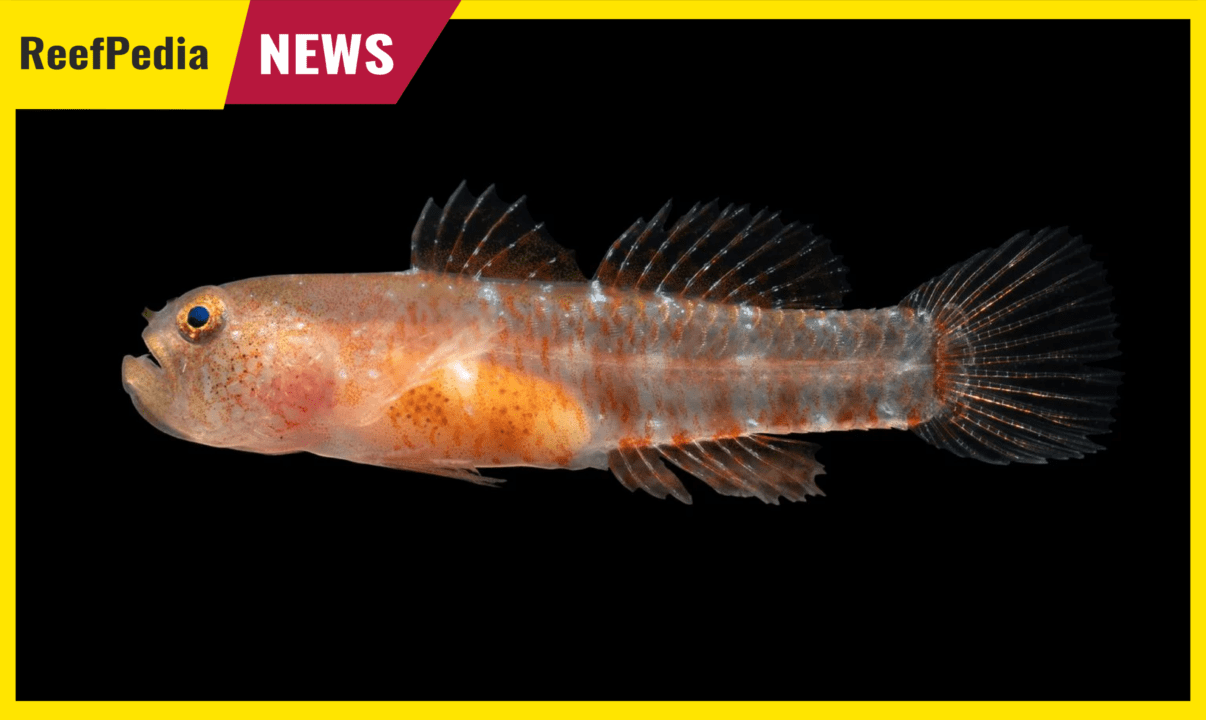Table of Contents
Sueviota aethon – a new species of fish discovered in the Red Sea
A recent research expedition led by teams from King Abdullah University of Science and Technology and the University of Washington has discovered a new species of fish – Sueviota aethon, which has been recognized as belonging to the Gobiidae family. This fish is colloquially known as the grumpy dwarf goby.
The newly discovered species is named Sueviota aethon. The name “aethon” refers to one of the horses, Aethon, who according to Greek mythology pulled the chariot of the sun god Helios. This choice of name refers to the similarity of this species to another from the genus Sueviota, known as Pyrios, which is also the name of one of Helios’ horses.
The species was identified based on ten specimens collected by the research team from coastal reefs along the Red Sea coast of Saudi Arabia, at depths ranging from 10 to 30 meters, although an individual was also observed at a depth of 53 meters.
Publication in ZooKeys
On September 12, 2024, the renowned journal ZooKeys published research on the newly discovered species. The article by Viktor Nunes Peinemann, Lucía Pombo-Ayora, Luke Tornabene, and Michael Berumen thoroughly describes the new fish species.
Detailed Description of Sueviota aethon
Sueviota aethon is a small fish, ranging in length from 9.2 mm to 16.7 mm. It is characterized by its bright red color, which helps it blend into the surroundings of coral reefs covered with red algae. This is an adaptive feature that allows the fish to avoid predators and facilitates hunting for small invertebrates in its natural environment. Moreover, individuals with yellow-orange coloration have also been observed. Despite its small size, Sueviota aethon leads a predatory lifestyle, hunting in caves and crevices of reefs for small invertebrates.
The first dorsal fin of this fish has a rounded to square shape, with the second and third spines being longer than the first. The rays of the second dorsal fin are branched, a feature typical of all examined specimens. The body is covered with ctenoid scales (a type of scale characterized by the presence of small teeth or combs on the rear edge, these endings give the scales a rough texture, which may help fish in protection against predators).
Additionally, the fish has two rows of conical, irregularly arranged teeth in both jaws and characteristic enlarged fangs in the outer row of teeth of the upper jaw and the inner row of the lower jaw. These morphological adaptations suggest a predatory lifestyle for the fish, which uses its fangs to capture and consume small invertebrates.
Summary
The discovery of Sueviota aethon shows how much undiscovered life still lurks in the Red Sea. Scientists originally thought they had discovered a type of dwarf goby from 1972. However, unique features such as the grumpy expression of the face and large-sized fangs quickly distinguished this new species. Lucía Pombo-Ayora, one of the authors of the article in ZooKeys, noted that despite its small size, this fish is a terrifying predator in its habitat. Its unique appearance certainly contributed to naming the species, which refers to its grumpy facial expression.
It is worth mentioning that new species like Sueviota aethon increase our knowledge about marine ecosystems and highlight the necessity of their protection.
Interesting information from the life of seas and oceans can be found in the NEWS section on ReefPedia https://reefpedia.org
Welcome!
Photo obtained from: https://www.scienzenotizie.it/
About the author

Grzegorz Bubak
My fascination with marine aquariums began over two decades ago when I stumbled upon an article about this topic in a magazine. Since then, the underwater world has become my obsession and passion, shaping my everyday life. I started my adventure with marine aquariums with soft corals, which were my first step into this fascinating world. Over time, captivated by the diversity and beauty of SPS corals, I decided to focus on their cultivation, which continues to fill me with constant wonder.
Thanks to my experience and passion for marine aquariums, I am ready to share my knowledge and expertise with other enthusiasts in this field. I am happy to be part of the Reef Pedia community, which serves as an invaluable source of information for all marine aquarium lovers.

